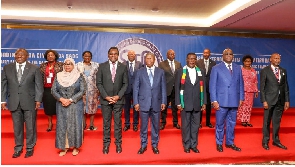Leaders of the Southern Africa Development Cooperation (SADC) bloc on Saturday failed to signal definite deployment of troops to the Democratic Republic of Congo, leaving it open for further assessment.
Instead, they spoke of providing “strategic guidance on the deployment” of what is to be known as the SADC Mission in the DRC (SAMIDRC) meant to restore peace and security in the country, one of its member states.
The gathering of the bloc in Luanda, Angola, had signaled a high-level concern for the DRC, which is heading into elections next month amid renewed violence in eastern parts of the country.
And while the leaders said more member states have committed resources towards actual deployment of the mission, no specific timelines were given.
The leaders, instead, “expressed concern at the deterioration of the security and humanitarian situation in the eastern DRC and the reported resumption of attacks and occupation of territory by the M23, in clear violation of the ceasefire.”
Angolan President Joao Lorenco, also the AU mediator for the Great Lakes region, had helped broker a ceasefire between Congolese armed forces (FARDC) and the M23, the biggest rebel group in eastern DRC.
Part of that deal, known as the Luanda Process, was meant to see M23 withdraw from territories in exchange for cantonment and gradual inclusion in a political dialogue.
Essentially, that was to also help end animosity between Rwanda and DRC who have accused one another of supporting troublesome rebel groups against each other.
And if that was to hold, it could support a political dialogue between armed groups and the government known as the Nairobi process, mediated by former Kenyan President Uhuru Kenyatta.
But recent violence has sort of reversed the gear, the reason SADC leaders were meeting.
Congolese President Felix Tshisekedi, in attendance on Saturday, had been pushing SADC to deploy troops at least to rout out M23 which he considers terrorists. SADC had earlier pledged 500 troops but made no indication on when actual deployment was to happen.
Ahead of elections, the UN said Friday that in October alone, more than 300,000 people were driven from their homes by escalating violence in North Kivu Province bringing the total number of people displaced in eastern parts of the country to more than 6 million.
According to the UN Office for the Coordination of Humanitarian Affairs (Ocha), this year’s $2.3 billion Humanitarian Response Plan for the Democratic Republic of the Congo is currently only 36 percent funded, with just two months left in the year.
The reported resumption of attacks and occupation of territory by the M23, in clear violation of the Cease Fire was also an issue of discussions during the Extra-Ordinary Summit held in Luanda Saturday, a gathering aimed at finding a lasting solution to the security challenges in the Eastern DRC.
The DRC will hold elections in December, but Tshisekedi has been at odds with the East African Community Regional Force which deployed a year ago in eastern parts of the country. It will now be forced to leave by December 8.
“[The] Summit reiterated the need for SADC to spearhead efforts towards mobilisation of resources for facilitating peace and security in the SADC Region. These efforts include reviving discussions to establish and operationalise the SADC Peace Fund and engaging International Cooperating Partners.
The summit hosted by President Lourenço, was also attended by Presidents Cyril Ramaphosa of South Africa, Samia Suluhu Hassan of Tanzania, Hakainde Hichilema of Zambia and Zimbabwe’s Emmerson Mnangagwa.
Lesotho, Namibia, Botswana, Malawi, Mozambique and Eswatini sent senior government officials envoys.
Africa News of Tuesday, 7 November 2023
Source: theeastafrican.co.ke

















